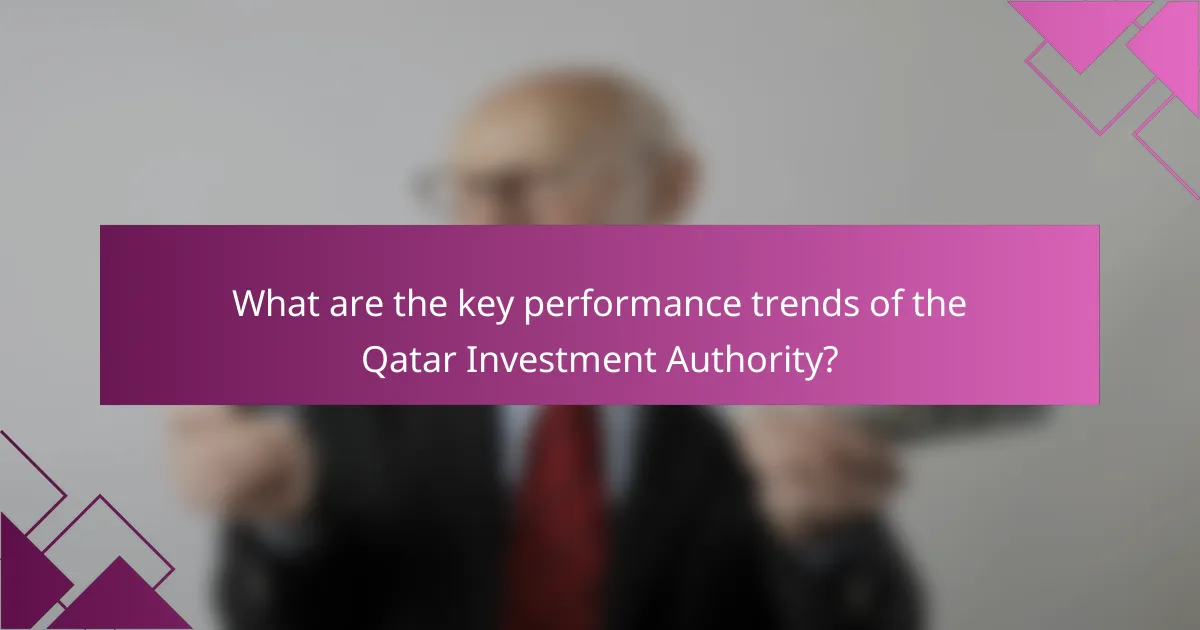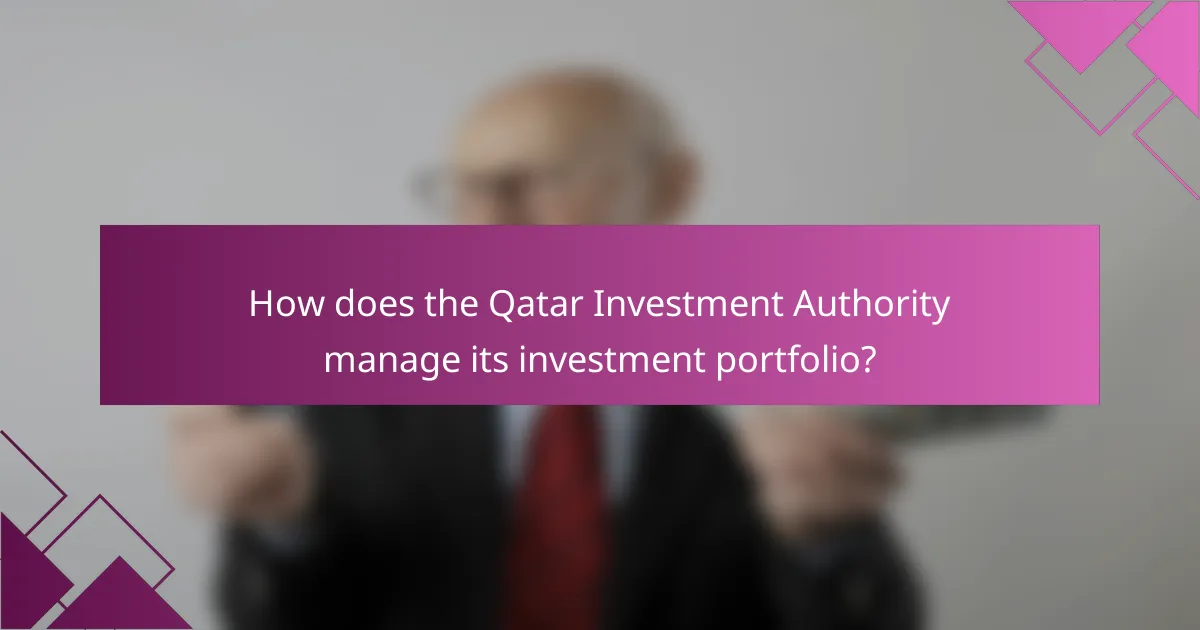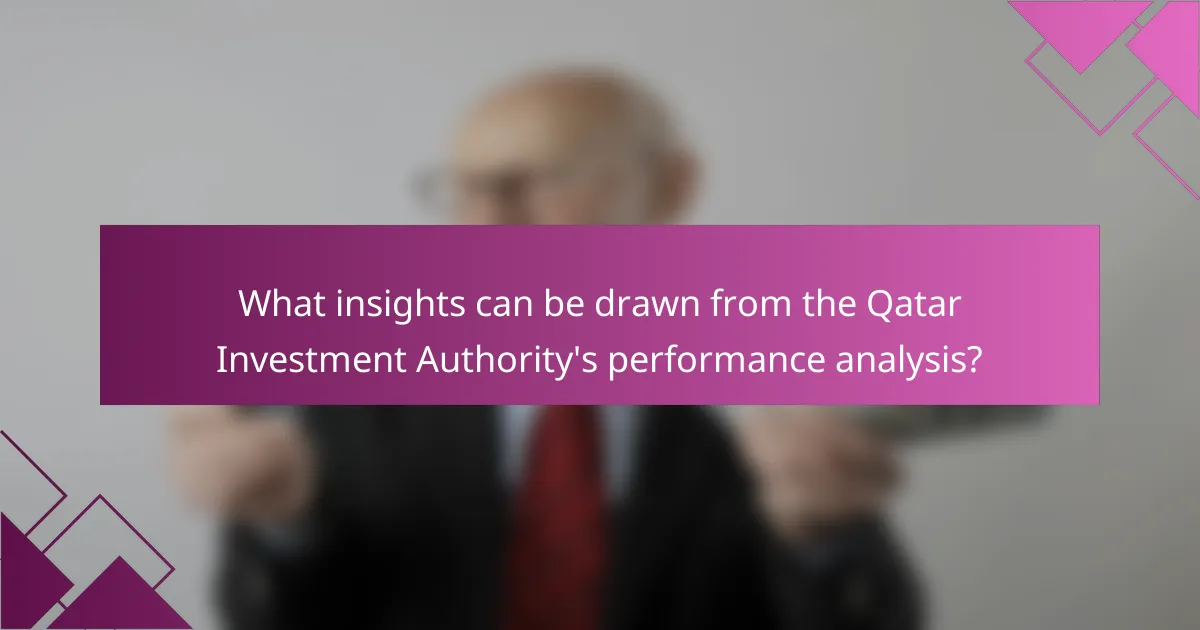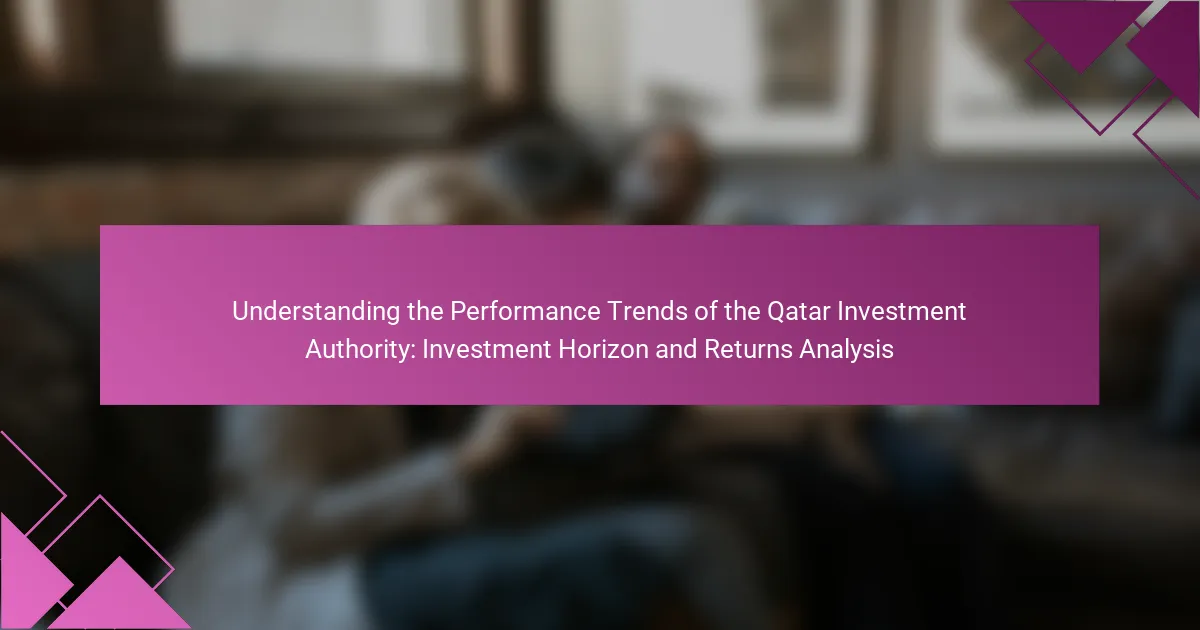
What are the key performance trends of the Qatar Investment Authority?
The key performance trends of the Qatar Investment Authority (QIA) include a focus on diversification and strategic investment. QIA has significantly increased its global investment portfolio over the past decade. The authority has allocated capital across various sectors, including technology, real estate, and renewable energy. In recent years, QIA has shown a trend towards sustainable investments. This aligns with global shifts towards environmental, social, and governance (ESG) criteria. The authority has also demonstrated resilience during economic downturns, maintaining steady returns. For instance, QIA reported a return of 10% on its investments in 2021. This performance reflects its adaptive strategies in a changing market environment. Overall, QIA’s key trends indicate a robust and forward-thinking investment approach.
How has the investment horizon of the Qatar Investment Authority evolved over time?
The investment horizon of the Qatar Investment Authority (QIA) has evolved significantly over time. Initially, QIA focused on long-term investments in traditional assets. This included sectors like real estate and infrastructure. Over the years, QIA expanded its portfolio to include alternative investments. This shift included private equity and hedge funds. The diversification aimed to enhance returns and mitigate risks. Recent trends show a growing interest in technology and sustainable investments. This evolution aligns with global investment trends emphasizing innovation and sustainability.
What factors influence the investment horizon of the Qatar Investment Authority?
The investment horizon of the Qatar Investment Authority is influenced by various factors. These include market conditions, geopolitical stability, and economic forecasts. The Authority assesses global economic trends to determine investment timelines. Additionally, the risk tolerance and liquidity needs of the fund play a crucial role. The diversification strategy of the portfolio also impacts the investment horizon. Long-term growth potential and expected returns guide decision-making processes. Furthermore, regulatory frameworks and international relations can affect investment timelines. Overall, these factors collectively shape the Authority’s strategic investment planning.
How do external economic conditions impact the investment horizon?
External economic conditions significantly influence the investment horizon. Economic factors such as inflation rates, interest rates, and GDP growth impact investor confidence. For instance, high inflation can erode purchasing power, prompting investors to shorten their investment horizons. Conversely, stable economic growth encourages longer-term investments. Interest rate fluctuations affect borrowing costs, influencing capital allocation decisions. A low-interest environment may extend investment horizons as borrowing becomes cheaper. Historical data shows that during economic downturns, like the 2008 financial crisis, investment horizons contracted as risk aversion increased. Therefore, external economic conditions play a crucial role in shaping the strategic timing and duration of investments.
What returns has the Qatar Investment Authority achieved in recent years?
The Qatar Investment Authority (QIA) has achieved an average annual return of approximately 8% over the past five years. This performance reflects a diversified investment strategy across various asset classes. In 2022, the QIA reported a total return of 12.5%, driven by strong equity market performance. The authority has also focused on alternative investments, which contributed significantly to overall returns. In 2021, the QIA’s portfolio saw a return of 10%, bolstered by recovery in global markets post-pandemic. The QIA’s strategic asset allocation has enabled it to navigate market volatility effectively. These returns indicate a robust performance in both public and private investments.
How do the returns compare to other sovereign wealth funds?
The returns of the Qatar Investment Authority (QIA) are competitive when compared to other sovereign wealth funds. As of 2022, QIA reported an average annual return of approximately 8%. This performance places it among the top tier of sovereign wealth funds globally. For comparison, the Government Pension Fund of Norway achieved a return of around 9.4% during the same period. The Abu Dhabi Investment Authority reported returns near 7.5%. These figures indicate that QIA performs well relative to its peers. The consistent returns reflect QIA’s diversified investment strategy and long-term focus.
What are the primary assets contributing to the returns of the Qatar Investment Authority?
The primary assets contributing to the returns of the Qatar Investment Authority include equities, real estate, and fixed income investments. Equities form a significant portion of the portfolio, providing growth potential and dividends. Real estate investments offer stable cash flows and long-term appreciation. Fixed income investments contribute to capital preservation and steady income. The diversification across these asset classes enhances overall returns and mitigates risks. As of recent reports, the Qatar Investment Authority holds substantial stakes in global companies, which further boosts its returns.

How does the Qatar Investment Authority manage its investment portfolio?
The Qatar Investment Authority manages its investment portfolio through strategic asset allocation. It diversifies investments across various asset classes, including equities, fixed income, real estate, and alternative investments. The authority employs a long-term investment horizon to maximize returns. It also utilizes in-house expertise and external advisors for market analysis. Regular portfolio reviews ensure alignment with financial goals. The authority focuses on sustainable investments, considering environmental, social, and governance factors. Its proactive risk management strategy aims to mitigate potential losses. This approach is supported by a strong governance framework and adherence to global best practices.
What strategies does the Qatar Investment Authority employ for asset allocation?
The Qatar Investment Authority employs a diversified asset allocation strategy. This strategy includes investments across various asset classes. These classes encompass equities, fixed income, real estate, and alternative investments. The authority focuses on both domestic and international markets. It aims to achieve long-term capital appreciation and sustainable returns. The strategy also involves risk management practices to mitigate potential losses. Additionally, the authority adapts its allocation based on market conditions. This dynamic approach allows the Qatar Investment Authority to optimize its investment performance.
How does diversification play a role in the investment strategy?
Diversification reduces risk in investment strategies. By spreading investments across various assets, investors can minimize the impact of a poor-performing asset. This approach enhances the potential for returns while protecting against volatility. Research shows that a well-diversified portfolio can lead to more stable returns over time. For instance, the Modern Portfolio Theory highlights that diversification can optimize returns for a given level of risk. Historical data supports that diversified portfolios often outperform non-diversified ones in the long run. Thus, diversification is essential for effective investment strategies.
What metrics are used to evaluate the performance of investments?
Common metrics used to evaluate investment performance include return on investment (ROI), net present value (NPV), internal rate of return (IRR), and total shareholder return (TSR). ROI measures the gain or loss generated relative to the investment cost. NPV calculates the difference between present value of cash inflows and outflows over time. IRR represents the annualized rate of return where NPV equals zero. TSR accounts for stock price appreciation and dividends paid to shareholders. These metrics provide a comprehensive view of how effectively investments are performing.
What challenges does the Qatar Investment Authority face in its investment strategy?
The Qatar Investment Authority faces several challenges in its investment strategy. Market volatility significantly impacts its portfolio performance. Geopolitical risks in the Middle East create uncertainties for investments. The authority also encounters difficulties in identifying high-return opportunities. Regulatory changes in various countries can affect investment decisions. Additionally, competition from other sovereign wealth funds increases pressure on returns. Finally, managing a diverse global portfolio requires extensive resources and expertise. These challenges necessitate a strategic approach to mitigate risks and optimize returns.
How does geopolitical risk affect investment decisions?
Geopolitical risk significantly impacts investment decisions by influencing investor confidence and market stability. Investors often assess the potential for political instability, conflict, or changes in government policy. High geopolitical risk can lead to increased volatility in financial markets. For example, during the Arab Spring, many investors withdrew from markets in affected regions, fearing instability. Additionally, geopolitical tensions can affect commodity prices, influencing sectors such as energy and agriculture. A 2019 study by the International Monetary Fund found that geopolitical events can lead to a 5% decline in stock market returns in affected areas. Therefore, investors closely monitor geopolitical developments to mitigate risks and protect their investments.
What are the implications of global market fluctuations on returns?
Global market fluctuations significantly impact investment returns. These fluctuations can alter asset prices, affecting overall portfolio performance. For instance, a 2020 study by the International Monetary Fund indicated that a 1% change in global market indices could lead to a 0.5% change in returns for international portfolios. Additionally, currency volatility can influence returns for investments in foreign markets. When the U.S. dollar strengthens, returns on foreign investments may diminish when converted back to dollars. Historical data shows that during economic downturns, such as the 2008 financial crisis, returns on equities dropped by an average of 37%. These examples illustrate the direct relationship between global market conditions and investment performance.

What insights can be drawn from the Qatar Investment Authority’s performance analysis?
The Qatar Investment Authority’s performance analysis reveals significant trends in investment returns and strategic asset allocation. The analysis indicates that the authority has diversified its portfolio across various sectors, including technology, real estate, and renewable energy. This diversification has contributed to a more stable return profile over time. Additionally, the authority’s long-term investment horizon has allowed it to capitalize on emerging markets and innovative sectors. Historical data shows that the Qatar Investment Authority achieved an annualized return of approximately 8% over the past decade. This performance underscores the effectiveness of its investment strategies and adaptability to market changes. Overall, the insights highlight the importance of diversification and a long-term perspective in achieving robust investment outcomes.
How can investors learn from the Qatar Investment Authority’s strategies?
Investors can learn from the Qatar Investment Authority’s strategies by analyzing its long-term investment approach. The authority focuses on diversification across asset classes and geographies. This strategy helps mitigate risks associated with market volatility. Additionally, the Qatar Investment Authority emphasizes investments in sustainable and innovative sectors. It allocates a significant portion of its portfolio to real estate and infrastructure. Historical data shows that this diversification has led to stable returns over time. By studying these strategies, investors can adapt similar principles to enhance their own portfolios.
What best practices can be applied from the Qatar Investment Authority’s approach?
The Qatar Investment Authority (QIA) employs several best practices that can be applied in investment strategies. Diversification is a key practice, as QIA invests across various asset classes and geographies. This reduces risk and enhances potential returns. Long-term investment horizons are also emphasized, allowing QIA to ride out market volatility. Strategic partnerships with global firms enhance access to expertise and opportunities. QIA’s focus on sustainability aligns investments with environmental, social, and governance (ESG) principles. Data-driven decision-making is crucial, as QIA utilizes analytics to inform its investment choices. Lastly, a strong governance framework ensures accountability and transparency in operations. These practices contribute to QIA’s reputation as a leading sovereign wealth fund.
How can understanding these trends benefit future investment decisions?
Understanding performance trends can enhance future investment decisions by providing insights into market behavior. Analyzing these trends allows investors to identify patterns in returns and risks. For instance, historical data from the Qatar Investment Authority (QIA) shows that strategic asset allocation has led to consistent growth. Recognizing which sectors outperform can guide investors in selecting profitable opportunities. Understanding economic cycles enables better timing for entry and exit points. Additionally, trends in global investment flows can inform diversification strategies. Overall, leveraging trend analysis can lead to more informed, data-driven investment choices.
What are the future outlook and trends for the Qatar Investment Authority?
The future outlook for the Qatar Investment Authority (QIA) indicates a focus on diversification and sustainable investments. QIA aims to reduce reliance on oil revenues by investing in various sectors globally. Trends show increased interest in technology, renewable energy, and healthcare sectors. The authority is also prioritizing investments in emerging markets. Additionally, QIA is expected to enhance its strategic partnerships with global firms. The commitment to sustainable investing aligns with global trends towards ESG (Environmental, Social, and Governance) criteria. This approach will likely lead to long-term value creation. Overall, QIA’s future strategies reflect adaptability to changing economic conditions.
How might changes in global finance impact the Qatar Investment Authority’s strategy?
Changes in global finance may significantly impact the Qatar Investment Authority’s (QIA) strategy. Fluctuations in interest rates can influence investment costs. For instance, rising rates may lead to higher borrowing costs, prompting QIA to reassess its leverage strategies. Currency volatility can also affect QIA’s international investments. A strong dollar could diminish returns on foreign assets.
Additionally, shifts in global economic growth can alter QIA’s focus sectors. A slowdown in emerging markets might push QIA to diversify into more stable economies. Changes in commodity prices, especially oil, can directly impact QIA’s revenue streams. For example, declining oil prices may necessitate a shift towards alternative investments.
Regulatory changes in key markets can also affect QIA’s investment opportunities. Increased scrutiny on foreign investments could lead to a more cautious approach. Overall, the QIA must continuously adapt its strategy in response to these global financial changes to optimize its investment returns.
What emerging markets or sectors could the Qatar Investment Authority target for growth?
The Qatar Investment Authority could target technology and renewable energy sectors for growth. The technology sector includes artificial intelligence, cybersecurity, and fintech. These areas show significant global demand and innovation potential. Renewable energy, particularly solar and wind, aligns with global sustainability trends. Qatar has abundant solar resources, making it a strategic investment area. Additionally, healthcare and biotechnology are emerging sectors with growth opportunities. The global healthcare market is projected to reach $11.9 trillion by 2027. These sectors offer substantial returns and align with Qatar’s long-term economic diversification goals.
The main entity of this article is the Qatar Investment Authority (QIA). The article provides a detailed analysis of QIA’s performance trends, focusing on its investment horizon and returns. Key points include QIA’s diversification strategy across various sectors such as technology, real estate, and renewable energy, as well as its emphasis on sustainable investments. The discussion also highlights the influence of external economic conditions and geopolitical risks on QIA’s investment decisions, alongside a comparison of its returns with other sovereign wealth funds. Additionally, insights into best practices and future outlooks for QIA’s investment strategies are presented.
